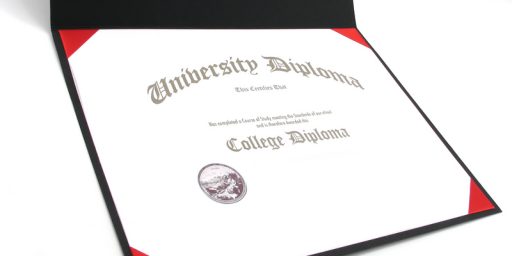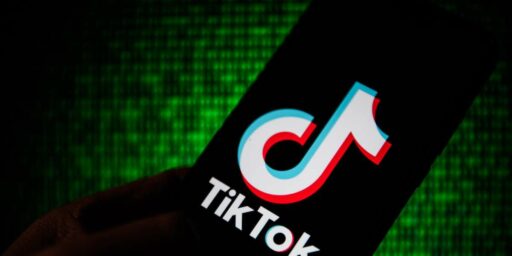LinkedIn Turns 10, Purpose Still Unclear
Today, LinkedIn celebrates its tenth anniversary. It's 225 million members are apparently using it as some sort of business network for some purpose.
Today, LinkedIn celebrates its tenth anniversary. It’s 225 million members are apparently using it as some sort of business network for some purpose.
The Next Web (“LinkedIn is 10 years old today: Here’s the story of how it changed the way we work“) tries to explain:
Today marks a historic moment for one of Silicon Valley’s biggest and well-known companies. It has been a decade since LinkedIn was founded as a business-related social network and now it has grown up to become a successful public company with more than 225 million members and nearly $325 million in revenue.
Founded by Reid Hoffman, Allen Blue, Konstantin Guericke, Eric Ly, and Jean-Luc Vaillant on May 5, 2003, LinkedIn has gone on to become a company most startups dream about growing into, and has certainly played a big part in bringing professional lives online and making them more social.
Let’s face it, the existing way of finding a job and making connections is just not working anymore. There’s an adage that says “It’s not what you know, it’s who you know.” LinkedIn is proof of that. Simply finding an appealing job and submitting a resume isn’t enough — now companies are looking for personalized approaches and recommendations from networks.
[…]
When LinkedIn first started, it was a social network for professionals, where users could host their resumes online. The purpose for many was to seek out jobs and have their colleagues and mentors leave recommendations to bolster their credibility. But in the ten years since, it has slowly evolved into more of a contact relationship management service, but for individuals.
While perhaps fully capable of building out these services, the company opted instead to acquire those that best fit its needs.
In its history, eight companies have been acquired by LinkedIn. The first was mSpoke in 2010 for its “adaptive personalization engine” and continued on with ChoiceVendor for its business reviews offering. Soon other purchases were made over the next three years, some for its business-facing service while others were for its core users.
The acquisitions of CardMunch, Connected, Rapportive, SlideShare, andPulse have gone on to strengthen the ability for users to network on the LinkedIn platform. Because the company embraced the mobile age, these purchases didn’t seem to be far-fetched. With CardMunch through to the adoption of Pulse, LinkedIn has made it possible for a person to manage their contact relationships from its very beginning when a business card is presented, through to maintaining the friendship by following their updates and keeping in touch.
I’ve been on LinkedIn for years but have never really figured out what to do with it. I make “connections,” but they’re all people that I either already know “IRL” or through the web.
Granted, I’m not looking for a new job. But I’m not even sure how I’d use LinkedIn to do that unless I were unemployed. After all, several people at my office are part of my network; it doesn’t strike me as prudent to let the people you work with know you’re looking to move on.






It’s a low energy Facebook for professionals. I use it to look up colleagues and classmates that have spread to the winds. It’s also useful for remembering ‘what’s his name?’… Someone whose paper you read or meet briefly at a conference but can’t recall their contact information.
When I was out of work last year, I updated all of my information and started joining groups and putting out “feelers” to recruiters.
It was a waste of my time. Why? Not because I lacked experience in my field but rather I did not work for a well known firm for nearly 15 years. One might think such stability would be a plus but it did not matter.
Then I got hired by the Home Depot as a supply chain analyst. I’ve been there for a little over 6 months. Without even looking, I’ve received several job offers already from other firms. It’s really odd how it works.
Two things get the attention of recruiters: Employment at a large corporation and/or an MBA.
I closed my linked in account after auditors used it for social engineering to find out my position at the bank I worked for and trick staff into giving them NPI informaion. All IT professionals should not have a linked in account.
I don’t do LinkedIn, but a lightly younger cohort of working engineers seem to be using it as their primary contact tracking and job seeking mechanism.
The advantage to it not being Facebook would be partitioning of course. It is for working-self.
Lucy Kellaway already explained Linkedin some years ago
http://www.ft.com/cms/s/0/58ad9e70-f64e-11e0-86dc-00144feab49a.html#ixzz2SRJsCvCC
“The only thing I can think of is that LinkedIn is really a dating site in disguise. I know two people who use it like this to considerable effect. You check out the picture and the CV and take it from there. It is all above board, you can do it in office hours and with none of the embarrassment of being on Match.com.
Otherwise I simply can’t see why one would want to link up with strangers in this corporate Turkish bath. The only people who I don’t know who I might like to connect with on LinkedIn are Mick Jagger, Philip Roth and Bill Gates, but then I’m guessing that they don’t want to connect with me. The flaw in the system is the one spotted by Groucho Marx: you don’t want to join any club that would have you as a member.”
@Andre Kenji:
A software engineer who changes jobs semi-aggressively, say every 3-5 years, could have 5 sets of former co-workers after 20 years. Say you have 20 good “work friends” at each. You’ll maintain social contacts with some, but if you want to let people you’ve “worked with” know that you are looking for a new gig, it is a data management problem.
In the old days, pre-LinkedIn, I remember someone making a spreadsheet for our set of consultant-friends.
Automating that, and leveraging other people’s data entry, is not just a dating service.
(My only real beef with LinkedIn is that I didn’t invent it, nor do I own it. I’d much rather have all the bases belong to me.)
I’ve been on LinkedIn from the very beginning, and I also have no idea what it’s for. I keep my profile up to date every time I change jobs or am looking for a job, but I’ve never found a single use for it. Definitely never got a job offer from it, or even an email from someone about a position.
Facebook is for stalking high school girfriends.
Linkdin is for stalking colleagues.
Or so I hear…I don’t belong to either site…but I’m currently working on establishing an anti-social networking site.
@C. Clavin:
For all we know (or anybody else for that matter) you already have done it. That’s the beauty of being anti-social!
Like Ben, I’ve been “In” for years and have accumulated over 400 contacts. I work for a major corporation, and I get the occasional recruiter nudge, but those mails feel like fishing expeditions to be honest. I guess I hope that if I ever needed a job one day, I would be able to leverage the site to let former colleagues and customers know I’m available – but I have no idea how that will go.
If you are extremely mobile and are interacting with people who are extremely mobile, LinkedIn is about the best way to keep in touch with people. I otherwise would have lost track of quite a few of my colleagues and friends. Especially useful when they’ve gone off and formed their own companies in different countries all over the world.
Every now and then I get headhunters nibbling at me through Linked-In. If you’re a headhunter looking for someone with a bizarre set of skills, Linked-In is probably the easiest way to search for someone with the basket of skills.